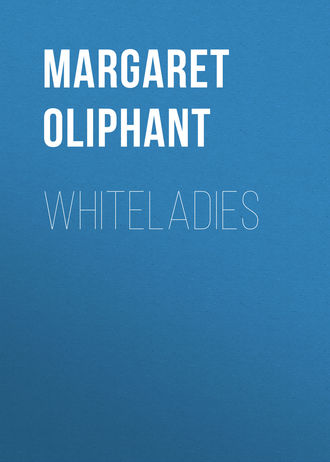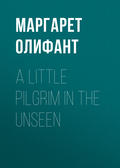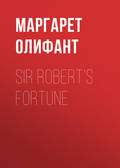
Маргарет Олифант
Whiteladies
“Go to bed, Reine; I am tired too – forgive me, dear,” she said with a sigh, “I cannot talk to you to-night.”
“What is it, Aunt Susan?” said Reine softly, looking at her with anxious eyes.
“It is nothing – nothing! only I cannot talk to you. I am not angry; but leave me, dear child, leave me for to-night.”
“Aunt Susan,” said the girl, going up to her again, and once more putting an arm round her, “it is something about —that woman. If it is not us, it is her. Why does she trouble you? – why is she here? Don’t send me away, but tell me about her! Dear Aunt Susan, you are ill, you are looking so strange, not like yourself. Tell me – I belong to you. I can understand you better than any one else.”
“Oh, hush, hush, Reine; you don’t know what you are saying. It is nothing, child, nothing! You understand me?”
“Better than any one,” cried the girl, “for I belong to you. I can read what is in your face. None of the others know, but I saw it. Aunt Susan, tell me – whisper – I will keep it sacred, whatever it is, and it will do you good.”
Miss Susan leaned her head upon the fragile young creature who clung to her. Reine, so slight and young, supported the stronger, older woman, with a force which was all of the heart and soul; but no words came from the sufferer’s lips. She stood clasping the girl close to her, and for a moment gave way to a great sob, which shook her like a convulsion. The touch, the presence, the innocent bosom laid against her own in all that ignorant instinctive sympathy which is the great mystery of kindred, did her good. Then she kissed the girl tenderly, and sent her away.
“God bless you, darling! though I am not worthy to say it – not worthy!” said the woman, trembling, who had always seemed to Reine the very emblem of strength, authority, and steadfast power.
She stole away, quite hushed and silenced, to her room. What could this be? Not worthy! Was it some religious panic that had seized upon Miss Susan – some horror of doubt and darkness, like that which Reine herself had passed through? This was the only thing the girl could think of. Pity kept her from sleeping, and breathed a hundred prayers through her mind, as she lay and listened to the old clock, telling the hours with its familiar voice. Very familiar, and yet novel and strange – more strange than if she had never heard it before – though for many nights, year after year, it had chimed through her dreams, and woke her to many another soft May morning, more tranquil and more sweet even than this.
CHAPTER XXXIX
Next day was the day of the great dinner to which Miss Susan had invited half the county, to welcome the young master of the house, and mark the moment of her own withdrawal from her long supremacy in Whiteladies. Though she had felt with some bitterness on the previous night the supposed intention of Herbert and Reine to supplant her at once, Miss Susan was far too sensible a woman to make voluntary vexation for herself, out of an event so well known and long anticipated. That she must feel it was of course inevitable, but as she felt no real wrong in it, and had for a long time expected it, there was not, apart from the painful burden on her mind which threw a dark shadow over everything, any bitterness in the necessary and natural event. She had made all her arrangements without undue fuss or publicity, and had prepared for herself, as I have said, a house, which had providentially fallen vacant, on the other side of the village, where Augustine would still be within reach of the Almshouses. I am not sure that, so far as she was herself concerned, the sovereign of Whiteladies, now on the point of abdication, would not have preferred to be a little further off, out of daily sight of her forsaken throne; but this would have deprived Augustine of all that made life to her, and Miss Susan was too strong, too proud, and too heroic, to hesitate for a moment, or to think her own sentiment worth indulging. Perhaps, indeed, even without that powerful argument of Augustine, she would have scorned to indulge a feeling which she could not have failed to recognize as a mean and petty one. She had her faults, like most people, and she had committed a great wrong, which clouded her life, but there was nothing petty or mean about Miss Susan. After Reine had left her on the previous night, she had made a great effort, and recovered her self-command. I don’t know why she had allowed herself to be so beaten down. One kind of excitement, no doubt, predisposes toward another; and after the triumph and joy of Herbert’s return, her sense of the horrible cloud which hung over her personally, the revelation which Giovanna at any moment had it in her power to make, the evident intention she had of ingratiating herself with the new-comers, and the success so far of the attempt, produced a reaction which almost drove Miss Susan wild! If you will think of it, she had cause enough. She, heretofore an honorable and spotless woman, who had never feared the face of man, to lie now under the horrible risk of being found out – to be at the mercy of a passionate, impulsive creature, who could at any moment cover her with shame, and pull her down from her pedestal. I think that at such moments to have the worst happen, to be pulled down finally, to have her shame published to the world, would have been the best thing that could have happened to Miss Susan. She would then have raised up her humbled head again, and accepted her punishment, and raced the daylight, free from fear of anything that could befall her. The worst of it all now was this intolerable sense that there was something to be found out, that everything was not honest and open in her life, as it had always been. And by times this consciousness overpowered and broke her down, as it had done on the previous night. But when a vigorous soul is thus overpowered and breaks down, the moment of its utter overthrow marks a new beginning of power and endurance. The old fable of Antæus, who derived fresh strength whenever he was thrown, from contact with his mother earth, is profoundly true. Miss Susan had been thrown too, had fallen, and had rebounded with fresh force. Even Reine could scarcely see in her countenance next morning any trace of the emotion of last night. She took her place at the breakfast-table with a smile, with composure which was not feigned, putting bravely her burden behind her, and resolute to make steady head as long as she could against any storm that could threaten. Even when Herbert eluded that “business consultation,” and begged to be left free to roam about the old house, and renew his acquaintance with every familiar corner, she was able to accept the postponement without pain. She watched the young people go out even with almost pleasure – the brother and sister together, and Everard – and Giovanna at the head of the troop, with little Jean perched on her shoulder. Giovanna was fond of wandering about without any covering on her head, having a complexion which I suppose would not spoil, and loving the sun. And it suited her somehow to have the child on her shoulder, to toss him about, to the terror of all the household, in her strong, beautiful arms. I rather think it was because the household generally was frightened by this rough play, that Giovanna had taken to it; for she liked to shock them, not from malice, but from a sort of school-boy mischief. Little Jean, who had got over all his dislike to her, enjoyed his perch upon her shoulder; and it is impossible to tell how Herbert admired her, her strength, her quick, swift, easy movements, the lightness and grace with which she carried the boy, and all her gambols with him, in which a certain risk always mingled. He could not keep his eyes from her, and followed wherever she led, penetrating into rooms where, in his delicate boyhood, he had never been allowed to go.
“I know myself in every part,” cried Giovanna gayly. “I have all visited, all seen, even where it is not safe. It is safe here, M. Herbert. Come then and look at the carvings, all close; they are beautiful when you are near.”
They followed her about within and without, as if she had been the cicerone, though they had all known Whiteladies long before she had; and even Reine’s nascent suspicions were not able to stand before her frank energy and cordial ignorant talk. For she was quite ignorant, and made no attempt to conceal it.
“Me, I love not at all what is so old,” she said with a laugh. “I prefer the smooth wall and the big window, and a floor well frotté, that shines. Wood that is all cut like the lace, what good does that do? and brick, that is nothing, that is common. I love stone châteaux, with much of window, and little tourelles at the top. But if you love the wood, and the brick, très bien! I know myself in all the little corners,” said Giovanna. And outside and in, it was she who led the way.
Once again – and it was a thing which had repeatedly happened before this, notwithstanding the terror and oppression of her presence – Miss Susan was even grateful to Giovanna, who left her free to make all her arrangements, and amused and interested the new-comers, who were strangers in a sense, though to them belonged the house and everything in it; and I doubt if it had yet entered into her head that Giovanna’s society or her beauty involved any danger to Herbert. She was older than Herbert; she was “not a lady;” she was an intruder and alien, and nothing to the young people, though she might amuse them for the moment. The only danger Miss Susan saw in her was one tragic and terrible danger to herself, which she had determined for the moment not to think of. For everybody else she was harmless. So at least Miss Susan, with an inadvertence natural to her preoccupied mind, thought.
And there were a great many arrangements to make for the great dinner, and many things besides that required looking after. However distinctly one has foreseen the necessities of a great crisis, yet it is only when it arrives that they acquire their due urgency. Miss Susan now, for almost the first time, felt the house she had secured at the other end of the village to be a reality. She felt at last that her preparations were real, that the existence in which for the last six months there had been much that was like a painful dream, had come out suddenly into the actual and certain, and that she had had a change to undergo not much unlike the change of death. Things that had been planned only, had to be done now – a difference which is wonderful – and the stir and commotion which had come into the house with the arrival of Herbert was the preface of a commotion still more serious. And as Miss Susan went about giving her orders, she tried to comfort herself with the thought that now at last Giovanna must go. There was no longer any pretence for her stay. Herbert had come home. She had and could have no claim upon Susan and Augustine Austin at the Grange, whatever claim she might have on the inmates of Whiteladies; nor could she transfer herself to the young people, and live with Herbert and Reine. Even she, though she was not reasonable, must see that now there was no further excuse for her presence – that she must go. Miss Susan settled in her mind the allowance she would offer her. It would be a kind of blackmail, blood money, the price of her secret; but better that than exposure. And then, Giovanna had not been disagreeable of late. Rather the reverse; she had tried, as she said, to show de l’amitiè. She had been friendly, cheerful, rather pleasant, in her strange way. Miss Susan, with a curious feeling for which she could not quite account, concluded with herself that she would not wish this creature, who had for so long belonged to her, as it were – who had been one of her family, though she was at the same time her enemy, her greatest trouble – to fall back unaided upon the shop at Bruges, where the people had not been kind to her. No; she would, she said to herself, be very thankful to get rid of Giovanna, but not to see her fall into misery and helplessness. She should have an income enough to keep her comfortable.
This was a luxury which Miss Susan felt she could venture to give herself. She would provide for her persecutor, and get rid of her, and be free of the panic which now was before her night and day. This thought cheered her as she went about, superintending the hanging of the tapestry in the hall, which was only put there on grand occasions, and the building up of the old silver on the great oak buffet. Everything that Whiteladies could do in the way of splendor was to be exhibited to-night. There had been no feast when Herbert came of age, for indeed it had been like enough that his birthday might be his death day also. But now all these clouds had rolled away, and his future was clear. She paid a solemn visit to the cellar with Stevens to get out the best wines, her father’s old claret and Madeira, of which she had been so careful, saving it for Herbert; or if not for Herbert, for Everard, whom she had looked upon as her personal heir. Not a bottle of it should ever have gone to Farrel-Austin, the reader may be sure, though she was willing to feast him to-night, and give him of her best, to celebrate her triumph over him – a triumph which, thank heaven! was all innocent, not brought about by plotting or planning – God’s doing, and not hers.
I will not attempt to describe all the company, the best people in that corner of Berkshire, who came from all points, through the roads which were white and sweet with May, to do honor to Herbert’s home-coming. It is too late in this history, and there is too much of more importance to tell you, to leave me room for those excellent people. Lord Kingsborough was there, and proposed Herbert’s health; and Sir Reginald Parke, and Sir Francis Rivers, and the Hon. Mr. Skindle, who married Lord Markinhead’s daughter, Lady Cordelia; and all the first company in the county, down to (or up to) the great China merchant who had bought St. Dunstan’s, once the property of a Howard. It is rare to see a dinner-party so large or so important, and still more rare to see such a room so filled. The old musicians’ gallery was put to its proper use for the first time for years; and now and then, not too often, a soft fluting and piping and fiddling came from the partial gloom, floating over the heads of the well-dressed crowd who sat at the long, splendid table, in a blaze of light and reflection, and silver, and crystal, and flowers.
“I wish we could be in the gallery to see ourselves sitting here, in this great show,” Everard whispered to Reine as he passed her to his inferior place; for it was not permitted to Everard on this great occasion to hand in the young mistress of the house, in whose favor Miss Susan intended, after this night, to abdicate. Reine looked up with soft eyes to the dim corner in which the three used to scramble and rustle, and catch the oranges, and I fear thought more of this reminiscence than of what her companion said to her, who was ignorant of the old times. But, indeed, the show was worth seeing from the gallery, where old Martha, and young Jane, and the good French Julie, who had come with Reine, clustered in the children’s very corner, keeping out of sight behind the tapestry, and pointing out to each other the ladies and their fine dresses. The maids cared nothing about the gentlemen, but shook their heads over Sophy and Kate’s bare shoulders, and made notes of how the dresses were made. Julie communicated her views on the subject with an authority which her auditors received without question, for was not she French? – a large word, which takes in the wilds of Normandy as well as Paris, that centre of the civilized world.
Herbert sat with his back to these eager watchers, at the foot of the table, taking his natural place for the first time, and half hidden by the voluminous robes of Lady Kingsborough and Lady Rivers. The pink gros grain of one of those ladies and the gorgeous white moire of the other dazzled the women in the gallery; but apart from such professional considerations, the scene was a charming one to look at, with the twinkle of the many lights, the brightness of the flowers and the dresses – the illuminated spot in the midst of the partial darkness of the old walls, all gorgeous with color, and movement, and the hum of sound. Miss Susan at the head of the table, in her old point lace, looked like a queen, Martha thought. It was her apotheosis, her climax, the concluding triumph – a sort of phœnix blaze with which she meant to end her life.
The dinner was a gorgeous dinner, worthy the hall and the company; the wine, as I have said, old and rare; and everything went off to perfection. The Farrel-Austins, who were only relations, and not of first importance as county people, sat about the centre of the table, which was the least important place, and opposite to them was Giovanna, who had been put under the charge of old Dr. Richard, to keep her in order, a duty to which he devoted all his faculties. Everything went on perfectly well. The dinner proceeded solemnly, grandly, to its conclusion. Grace – that curious, ill-timed, after-dinner grace which comes just at the daintiest moment of the feast – was duly said; the fruits were being served, forced fruits of every procurable kind, one of the most costly parts of the entertainment at that season; and a general bustle of expectation prepared the way for those congratulatory and friendly speeches, welcomes of his great neighbors to the young Squire, which were the real objects of the assembly. Lord Kingsborough even had cleared his throat for the first time – a signal which his wife heard at the other end, and understood as an intimation that quietness was to be enforced, to which she replied by stopping, to set a good example, in the midst of a sentence. He cleared his throat again, the great man, and was almost on his legs. He was by Miss Susan’s side in the place of honor. He was a stout man, requiring some pulling up after dinner when his chair was comfortable – and he had actually put forth one foot, and made his first effort to rise, for the third time clearing his throat.
When – an interruption occurred never to be forgotten in the annals of Whiteladies. Suddenly there was heard a patter of small feet, startling the company; and suddenly a something, a pygmy, a tiny figure, made itself visible in the centre of the table. It stood up beside a great pyramid of flowers, a living decoration, with a little flushed rose-face and flaxen curls showing above the mass of greenery. The great people at the head and the foot of the table stood breathless during the commotion and half-scuffle in the centre of the room which attended this sudden apparition. “What is it?” everybody asked. After that first moment of excited curiosity, it became apparent that it was a child who had been suddenly lifted by some one into that prominent place. The little creature stood still a moment, frightened; then, audibly prompted, woke to its duty. It plucked from its small head a small velvet cap with a white feather, and gave forth its tiny shout, which rang into the echoes.
“Vive M. ’Erbert! vive M. ’Erbert!” cried little Jean, turning round and round, and waving his cap on either side of him. Vague excitement and delight, and sense of importance, and hopes of sugar-plums, inspired the child. He gave forth his little shout with his whole heart, his blue eyes dancing, his little cheeks flushed; and I leave the reader to imagine what a sensation little Jean’s unexpected appearance, and still more unexpected shout, produced in the decorous splendor of the great hall.
“Who is it?” “What is it?” “What does it mean?” “Who is the child?” “What does he say?” cried everybody. There got up such a commotion and flutter as dispersed in a moment the respectful silence which had been preparing for Lord Kingsborough. Every guest appealed to his or her neighbor for information, and – except the very few too well-informed, like Dr. Richard, who guilty and self-reproachful, asking himself how he could have prevented it, and what he should say to Miss Susan, sat silent, incapable of speech – every one sent back the question. Giovanna, calm and radiant, alone replied, “It is the next who will succeed,” she cried, sending little rills of knowledge on either side of her. “It is Jean Austin, the little heir.”
Lord Kingsborough was taken aback, as was natural; but he was a good-natured man, and fond of children. “God bless us!” he said. “Miss Austin, you don’t mean to tell me the boy’s married, and that’s his heir?”
“It is the next of kin,” said Miss Susan, with white lips; “no more his heir than I am, but the heir, if Herbert had not lived. Lord Kingsborough, you will forgive the interruption; you will not disappoint us. He is no more Herbert’s heir than I am!” again she cried, with a shiver of agitation.
It was the Hon. Mr. Skindle who supported her on the other side; and having heard that there was madness in the Austin family, that gentleman was afraid. “ ‘Gad, she looked as if she would murder somebody,” he confided afterward to the friend who drove him home.
“Not his heir, but the heir,” said Lord Kingsborough, good-humoredly, “a fine distinction!” and as he was a kind soul, he made another prodigious effort, and got himself out of his seat. He made a very friendly, nice little speech, saying that the very young gentleman who preceded him had indeed taken the wind out of his sails, and forestalled what he had to say; but that, nevertheless, as an old neighbor and family friend, he desired to echo in honest English, and with every cordial sentiment, their little friend’s effective speech, and to wish to Herbert Austin, now happily restored to his home in perfect health and vigor, everything, etc.
He went on to tell the assembly what they knew very well; that he had known Herbert’s father and grandfather, and had the happiness of a long acquaintance with the admirable ladies who had so long represented the name of Austin among them; and to each he gave an appropriate compliment. In short, his speech composed the disturbed assembly, and brought everything back to the judicious level of a great dinner; and Herbert made his reply with modest self-possession, and the course of affairs, momentarily interrupted, flowed on again according to the programme. But in the centre of the table, where the less important people sat, Giovanna and the child were the centre of attraction. She caught every one’s eye, now that attention had been called to her. After he had made the necessary sensation, she took little Jean down from the table, and set him on the carpet, where he ran from one to another, collecting the offerings which every one was ready to give him. Sophy and Kate got hold of him in succession, and crammed him with bonbons, while their father glared at the child across the table. He made his way even so far as Lord Kingsborough, who took him on his knee and patted his curly head. “But the little chap should be in bed,” said the kind potentate, who had a great many of his own. Jean escaped a moment after, and ran behind the chairs in high excitement to the next who called him. It was only when the ladies left the room that Giovanna caught him, and swinging him up to her white shoulder, which was not half so much uncovered as Kate’s and Sophy’s, carried him away triumphant, shouting once more “Vive M. ’Erbert!” from that eminence, as he finally disappeared at the great door.
This was Giovanna’s first appearance in public, but it was a memorable one. Poor old Dr. Richard, half weeping, secured Everard as soon as the ladies were gone, and poured his pitiful story into his ears.
“What could I do, Mr. Austin?” cried the poor little, pretty old gentleman. “She took him up before I could think what she was going to do; and you cannot use violence to a lady, sir, you cannot use violence, especially on a festive occasion like this. I should have been obliged to restrain her forcibly, if at all, and what could I do?”
“I am sure you did everything that was necessary,” said Everard, with a smile. She was capable of setting Dr. Richard himself on the table, if it had served her purpose, instead of being restrained by him, was what he thought.







